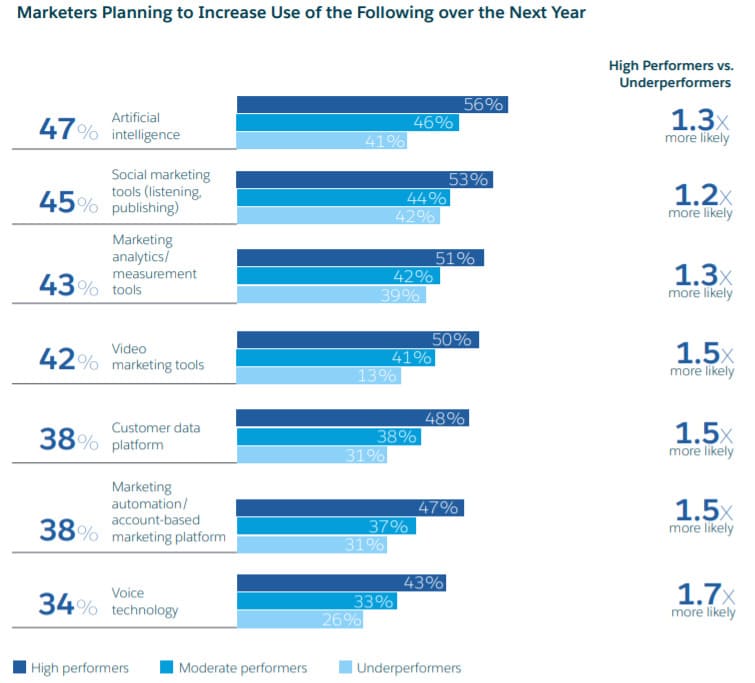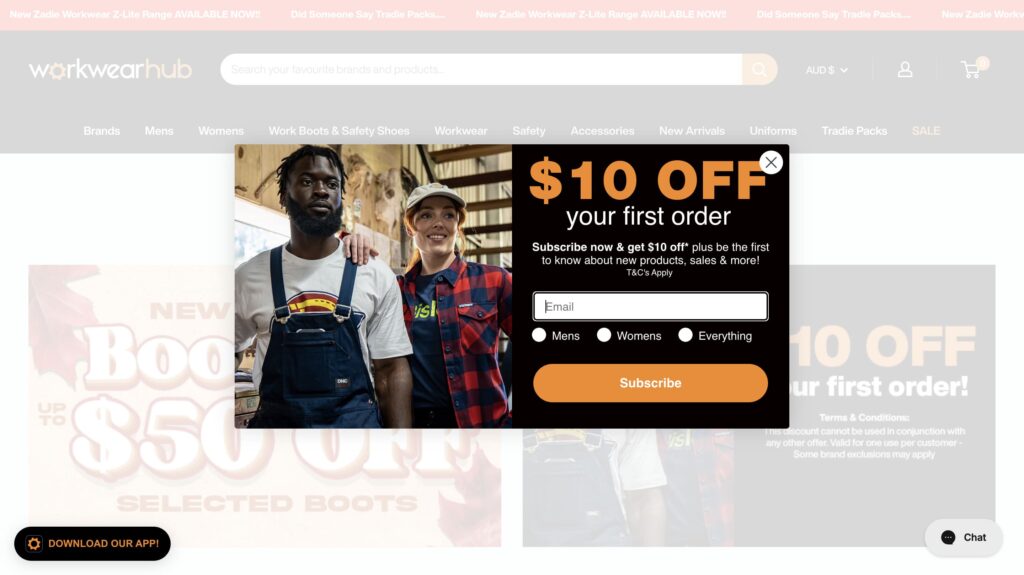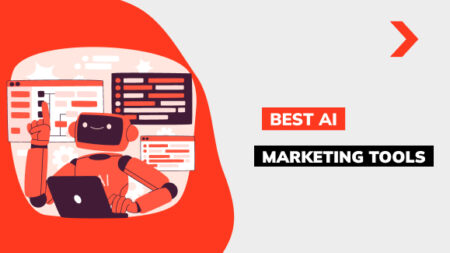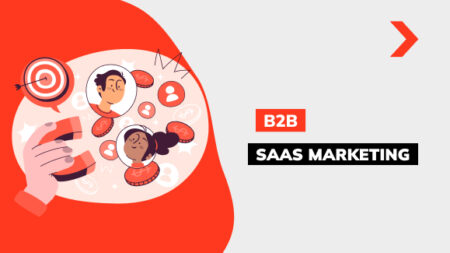B2C Digital Marketing Challenges & Solutions
The distinguishing feature of B2C marketing is that web technology allows the promotion of businesses online that sell their services and products to end consumers (individuals). It is more about targeting people who make decisions and influence decision-making. Therefore, competent B2C marketers know exactly how to generate more leads and close more deals using digital tools.

What Is B2C Digital Marketing?
B2C model marketing involves a segment aimed at the end consumer, visitor, user, or client of a service or product. In this situation, the transaction occurs only between a legal entity and an individual and is often a one-time event. In this format, B2C companies need to reach the customer with a minimal number of intermediaries to effectively compete, set prices, and, as a result, increase trade profitability. By ordering competent services from B2C marketers, you can be confident that the specialists will focus on reaching a wide audience through the use of specialized and up-to-date marketing approaches, where mass yet rapid communication plays a crucial role.
Essential B2C Marketing Channels
Since the business-to-consumer format targets individuals, the average transaction value is often relatively low. For this reason, content marketing and a comprehensive digital marketing strategy are employed, incorporating multiple online channels to reach a new level, establish a consistent sales cycle, enhance business profitability, attract a new target audience to purchase products or services, and ultimately increase overall revenue. Utilizing the right B2C digital marketing tools provides an opportunity to break into the top of the market by leveraging these relevant business models.

Digital Advertising
This is the most powerful tool for reaching a global audience through paid advertising on popular search engines, social media, and other platforms. Well-crafted proposals can attract not just hundreds but thousands of customers in the online space. Effective advertising campaigns quickly reach potential clients, enhancing brand awareness and increasing the overall conversion rate of a business’s website.
Email Marketing
The approach of engaging with an audience through personalized emails helps strengthen customer loyalty, boost sales, and retain the audience — an excellent solution that is crucial to put into practice. Although email marketing is an old technology, it remains proven and effective. Well-segmented, well-written, well-designed, and well-optimized emails sent to users’ inboxes contribute to the successful promotion of services and products.
Social Media Marketing
Only effective, clearly developed, and tested marketing on social platforms allows brands and various companies to establish direct contact with customers through specially created content, engagement, and attractive advertisements. Social platforms help create a unique brand image, build a loyal community around B2C companies, and attract new customers through regular posts and one of the most popular tools recently — targeted advertising.
Website Optimization
This process is essential for businesses to improve their structure, design, and content to ensure a smooth user experience. Fast-loading pages, intuitive navigation, and relevant content make a company’s or brand’s website more appealing to visitors and search engines, increasing conversions. Naturally, thanks to competent optimization efforts where every keyword matters, there is a real opportunity to reach a new level in the modern market.
SEO Strategies
Action plans are always aimed at improving the visibility of a business’s website in search engines through content optimization, technical improvements, and building quality backlinks. Effective and professional SEO helps attract organic traffic, improve search rankings, and ensure long-term brand growth. Naturally, strategies are always based on implementing external, internal, content marketing, and other online channels that contribute to active business promotion on the internet.
Influencer Collaborations
This is one of the most relevant ways of promoting businesses through influencers who have an impact on their target audience. Advertising campaigns with bloggers and experts help enhance brand or company trust, expand reach, and improve reputation, especially among younger audiences. This marketing is effective not only on social media platforms like Instagram, Facebook, and TikTok but also on YouTube and other channels people use for interaction and communication.
Major Challenges in B2C Marketing
In the B2C services market, one of the most important aspects to consider is the high cost of acquiring a new customer. In most cases, businesses start earning revenue only from the second visit. This is due not only to the enormous competition in the market but also to other factors. For this reason, brands should offer some sort of bonus to customers on their first visit to the website (such as a 10-90% discount, a “Buy 1 Get 1 Free” offer, free consultation, etc.).

Adapting to Changing Consumer Behaviors
One of the main challenges in B2C model marketing is adapting to constantly evolving business-to-consumer behavior. With the advancement of web technologies and access to diverse sources of information, customers are becoming more demanding, which is completely normal and understandable. Brands must respond flexibly, adequately, quickly, and competently to changes in preferences, offering a personalized approach and quality service.
Keeping Up with Market Trends and Innovations
Regularly monitoring current trends and implementing innovations can lead to real success. However, for B2C model businesses, this is a complex task primarily associated with the rapid development of web technologies and changes in audience preferences, which require monitoring and implementing new and relevant strategies. Successful brands adapt their approaches and utilize cutting-edge tools to maintain a competitive edge.
Choosing the Right Marketing Channels
One of the most critical aspects of successful promotion in the B2C sector is choosing the right, relevant online channels. The variety of platforms, such as social networks, search engines, and others, makes it challenging to identify the most effective and truly working channels. Brands must analyze audience behavior, test different strategies, and simultaneously adapt their approaches to achieve maximum results.
Managing and Utilizing Data Effectively
A key challenge for B2C model marketing is not only skillful but also effective management of business projects and campaigns, as well as the competent use of data. Collecting, analyzing, and interpreting large amounts of information requires using only the most advanced technologies and analytical web tools. Brands must identify valuable insights and maximize their use for personalizing marketing strategies.

Crafting a High-Impact B2C Marketing Strategy
The B2C model operates on specificity: a customer finds a service or product, purchases what they need, and satisfies their immediate need. Creating an individualized, relevant marketing strategy for promoting a brand or company involves not only understanding your audience but also using various digital marketing channels and continuously optimizing competent efforts. From increasing social media engagement to enhancing the customer experience, each aspect plays a crucial role in building customer loyalty.
Leverage Social Media Engagement
When interacting with the audience through social media, there’s an opportunity to build brand loyalty and increase online visibility. It’s enough to share valuable content, respond promptly (but not excessively) to comments, encourage user-generated content, and create a sense of community. It’s essential to use trending hashtags and collaborate with influencers to further expand reach and maintain relevance in the target market.
Implement Retargeting Campaigns
To re-engage potential customers who have previously shown interest in a particular brand or company, retargeting is essential. It’s not only a relevant form of targeted advertising today but also an opportunity to deliver valuable information to subscribers to entice them into making online purchases. By using Google Ads and social media advertising, businesses can remind users of products they have already viewed or added to their cart.
Optimize Content for SEO Success
High-quality content optimized for SEO is vital for attracting organic traffic, increasing visibility, and enhancing brand recognition in search engine results. Thorough keyword research and identifying terms that the audience is searching for, then naturally incorporating them into content (descriptions, texts, ads, articles), can lead to impressive results. Regularly updating the website with fresh, top-tier articles helps maintain authority and attract traffic.
Collaborate with Influencers
To significantly enhance brand authority, broaden reach, attract new followers, and engage people, collaboration with bloggers, celebrities, and reputable influencers whom their audience trusts is essential. As soon as this strategic step aligns with the target market, new customers will immediately start appearing. The key is to create authentic, engaging, and highly interesting content.

Build a Customer Loyalty Program
One of the most effective ways to encourage repeat transactions and improve customer retention is to develop and create special offers from the brand. These offers are based on forming a customer loyalty program aimed at attracting a new audience. Providing exclusive discounts, rewards, and personalized offers to regular customers can yield results. A well-thought-out program can enhance customer satisfaction and motivate them to continue choosing your brand over competitors.
Enhance the Customer Experience
To build strong, long-term relationships with the audience, businesses need to provide an exceptional, “exclusive”, ideal, and ultimately lasting customer experience. It’s important to optimize website navigation, offer multiple convenient communication options, and provide quick, helpful, and competent customer support. An impeccable user experience can be the difference between a one-time visitor and a loyal customer, and achieving this goal requires properly implemented business tools.
Prioritize Mobile Optimization
Since most consumers worldwide use modern gadgets like smartphones and mobile devices, optimizing a business website for mobile use is non-negotiable. It’s essential to ensure that the business website is truly responsive, loads quickly (within 1-3 seconds at most), and is easy to navigate on smartphones and tablets.
Emerging Trends in B2C Marketing
A few years ago, customers had time to calmly analyze product features, weighing all the pros and cons. Now, it’s the era of quick decisions. Today, consumers are driven by emotions and desires; people want to receive products right here and now, without long waits. Accordingly, the nature and technology of online sales have also been reshaped. Brands don’t give customers time to ponder, introducing credit options, promotions, installment plans, discounts, and even tracking consumer behavior.

Optimizing for Voice Search
With the rise of voice assistants, optimization for voice search has become truly critical. Companies and modern brands are fully adapting their SEO strategies to accommodate conversational queries from Internet users. The key to success is creating high-quality content that matches natural phrases and specific, clear frequently asked questions.
Leveraging Social Commerce
Social commerce is rapidly gaining popularity, turning social networks into fully-fledged online sales platforms. Interactive storefronts, click-to-buy options, and integration with chatbots help brands effectively engage with their audience. This approach promises to expand online sales opportunities and boost customer loyalty.
Embracing Subscription-Based Models
The subscription model remains a powerful strategy that allows brands to build a stable revenue stream and strengthen relationships with customers. Users appreciate the convenience of regular product deliveries and exclusive access to services. Businesses implementing subscriptions gain not only profits but also valuable insights into customer preferences, helping them tailor future offerings effectively.
Implementing Hyper-Local Targeting
Another excellent way to attract customers near a business is to implement hyper-local targeting technology. By using geolocation data and local event information, brands and companies create more relevant offers. This b2c marketers tactic is especially effective for stores, restaurants, and services that target a local audience.
The Ongoing Impact of Influencer Marketing
Modern influencer marketing, which includes collaborating with bloggers trusted by their audiences, continues to play a key role in promoting websites. Audiences trust the opinions of influencers, which helps brands strengthen their image and attract new customers. Collaborating with micro- and nano-influencers is becoming particularly relevant as it offers more genuine and personalized interactions.
FAQ
What is the difference between B2B and B2C digital marketing?
B2C and B2B digital marketing differ in terms of audience and approach. B2B marketing focuses on building long-term relationships, professionalism, and providing detailed information about services and products. In the B2C model, the emphasis is on emotions, convenience, and quick purchasing, requiring engaging content, attractive offers, and a seamless user experience to attract customers.
Why do you need B2C online marketing?
B2C online marketing is essential for effectively attracting and retaining customers, increasing brand awareness, and boosting sales. In the digital era, customers expect services and products to be accessible online. The use of specialized strategies by B2C marketers in professional SEO, email, content marketing, advertising in social networks, and electronic services helps brands and companies create attractive offers, strengthen loyalty, and ensure stable business growth.
What are some challenges with B2C marketing?
B2C internet marketing faces several challenges, including high competition, changing customer preferences, and the difficulty of retaining an audience. Personalization and creating relevant content have become critically important. Additionally, optimizing the user experience and building brand trust requires flexibility, continuous data analysis, and the adoption of new marketing approaches to achieve success.





